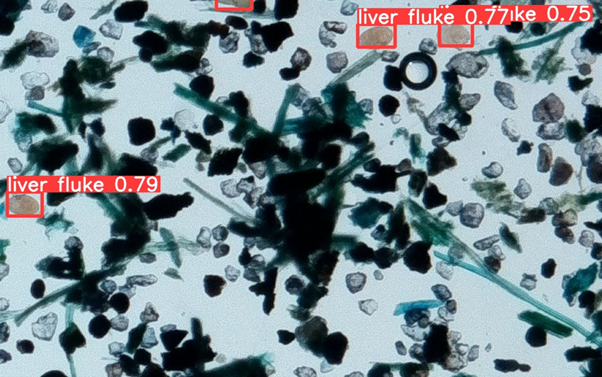Artificial intelligence breakthrough for animal infection detection

Image of a liver fluke
17 October 2022
Scientists have developed a way of using artificial intelligence to quickly identify parasites infecting animals.
A team from Aberystwyth University and disease technology company Techion has developed and tested new machine learning tools that automatically identify the parasite using images from a camera.
The discovery could help farmers in Wales and around the world diagnose infections quicker and subsequently speed up treatment.
Liver and rumen flukes are parasites that infect grazing livestock around the world, and can lead to loss of appetite, poorer body condition, and greater susceptibility to other infections.
The parasites are a particular challenge in Wales because of the mild and wet climate, but climate change makes it a growing, international issue.
Infections are diagnosed by finding fluke eggs in animal faeces, which currently need a skilled technician to identify.
The new technique uses a device that can capture images from processed faeces at high magnification and the breakthrough means that infections can be detected by farmers with results received within a day.
Dr Hefin Williams, Senior Lecturer in Agricultural Environment at Aberystwyth University, said:
“We believe that this project is a significant milestone in transforming and modernising the diagnosis and control of these infections. The algorithms developed as part of this project should make diagnosis more accessible and more effective. That means better veterinary health outcomes and more sustainable agricultural businesses.
“The new technique may make it possible to diagnose these infections on farms, or even pen-side, and it does not need any expensive materials to perform. The current methods are labour intensive, require specialised skills and are time consuming. This limits their utility and their effectiveness to guide treatments as farmers often need ‘same day’ diagnosis to allow them to correctly treat a group of animals.
“This new method will be paramount as effective control of liver fluke is forecast to be more challenging in the future with increased risk of infections because of climate change and the spread of fluke anthelmintic resistance in the UK.”
Dr Amanda Clare from the Department of Computer Science at Aberystwyth University commented:
"This use of AI to recognise liver flukes is a real example of automatic image processing used for the benefit of society through animal welfare. Artificial intelligence can be hugely beneficial when applied to challenges like this and taking this innovation out to be used directly on the farm is a great idea."
Eurion Thomas from Techion UK Ltd added:
“We already have good market reach in the animal health industry with customers using our FECPAKG2 system in vet clinics, retail stores and on farm to detect parasitic nematode infection quickly and accurately.
“The commercial release of our fluke egg detection system later this year will be a novel and significant expansion of our system capability and something our customers have long been asking for. This successful collaboration has allowed us to utilise the expertise within Aberystwyth University to help us develop a quick, affordable and reliable test that the industry can use to meet the growing needs of evidence-based medication of livestock.”
The project is part-funded by the Welsh Government, and the Wales Data Nation Accelerator.



